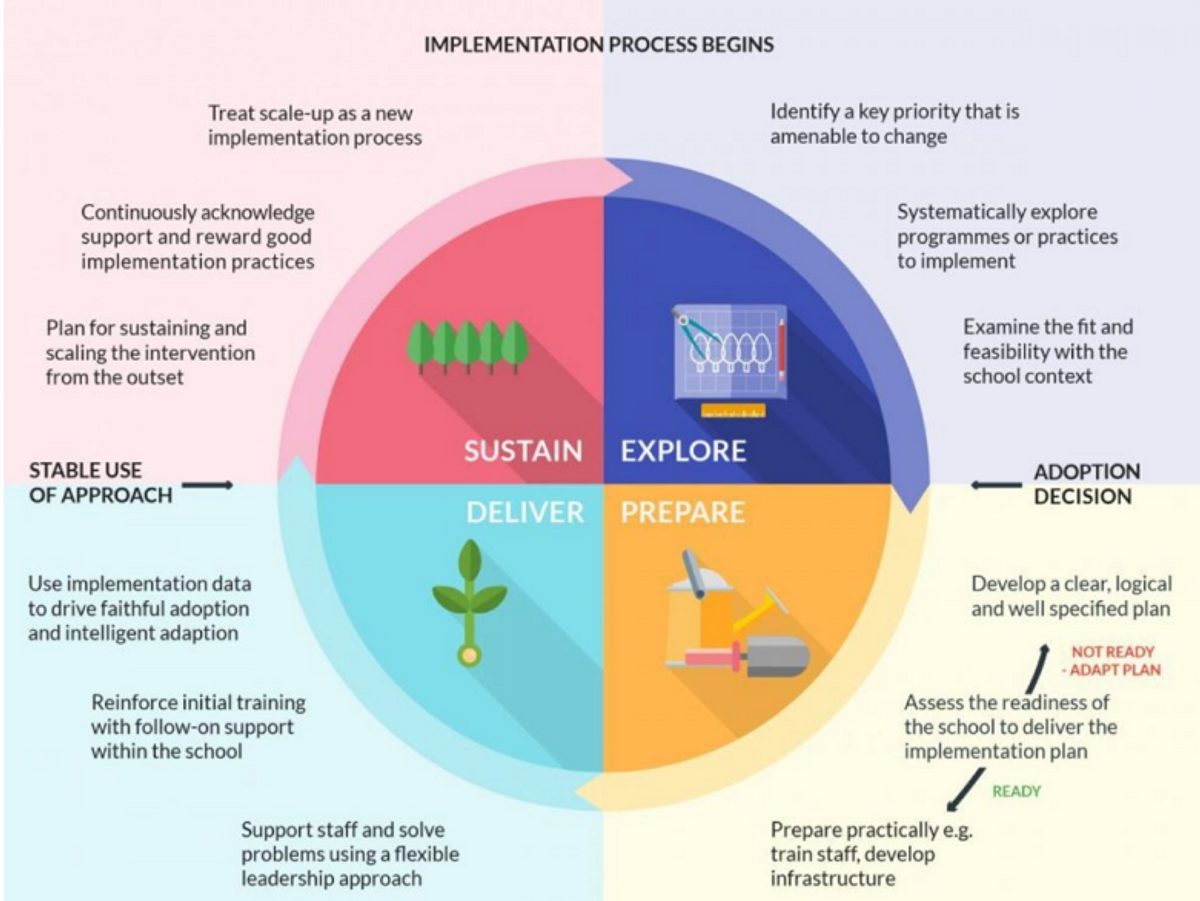An Introduction to Evidence-Informed School Improvement
A FREE online course from the South West’s Research School Network


Share on:

by Somerset Research School
on the
Tom Colquhoun is Director of West Somerset Research School, Assistant Headteacher and School Improvement Lead at The Blue School – a large, comprehensive secondary school in Wells, Somerset. Until recently, Tom also held the responsibility for Teaching and Learning.
In 2017, following the arrival of a new headteacher, we decided that we needed to ‘up our game’ when it came to making judgements about the quality of the teaching and learning taking place across the school. During briefings to the governing body, I was only ever able to talk in general terms about where the strengths lay and where there were priorities for development.
At this time, we launched a much more rigorous process of weekly ‘progress walks’. Seven members of the senior leadership team would visit one subject area each week and visit 3 or 4 lessons in a one-hour period. We were looking at the ‘typical’ experience for students from all year groups in that subject, across the week. All teachers in the team would be ‘visited’ (intentionally not ‘observed’) two or three times during the week and a judgement would be made about the progress being made by students. Clearly, no grading was used to judge teacher performance.
In no time at all, we had collected a significant amount of data on what was happening in lessons. Each (old-fashioned) term, we would visit in excess of 200 lessons and we quickly started to see emerging themes in terms of priorities. In that first year, we identified that the start of lessons needed to be improved. So, in 2018/19, we ran an internal training programme titled ‘The Unmissable 10’, based around implementing retrieval practice as effective lesson starters, using recommendations from the EEF’s Metacognition guidance.
So, in 2018/19, we ran an internal training programme titled ‘The Unmissable 10’, based around implementing retrieval practice as effective lesson starters, using recommendations from the EEF’s Metacognition guidance.

We continued to tweak and improve the structure for progress walks and in the following year, as part of a behaviour policy re-launch, focused on improving behaviour across the school. As you’d expect, we went to the EEF’s guidance and our appointed teaching coaches used the recommendations to deliver training and offer coaching support to their colleagues through a disciplined enquiry approach. In the Spring of 2020 things had to… pause, for a while at least!

In 2021/22, we had a year-long, wider focus on improving learning behaviours, picking up from where we left off with behaviour from before the COVID-related disruption. Teachers and support staff considered their ‘most tricky class’ and used an approach that they’d learnt about to improve outcomes. Successes (and failures) were shared at the end of the process.

Which brings us to this academic year. In summarizing last year’s findings from well over 400 lesson visits, we identified some really good examples of formal, summative assessment practice. However, the quality of the ongoing formative assessment practice was more variable. We consulted the evidence on effective feedback from the EEF’s Teaching & Learning Toolkit and also their excellent guidance report.
We also consulted the Projects section of the EEF website, where one can learn about the approaches or interventions that have already been trialled in schools, evaluated and rated. Here, we were reminded of Dylan William and Siobhan Leahy’s Embedding Formative Assessment programme. As a codified, two-year professional development programme, it’s been running for over 10 years and a recent effectiveness trail, ran by the EEF, has suggested that an average of two months additional progress can be made by students, over the two-year (KS4) period. All of our staff are now placed in Teacher Learning Communities and will work with colleagues to learn about five different formative assessment strategies in nine twilight sessions this year. Crucially, they must then try them out in their lessons. A paired observation process is also in place, so that peer coaching can take place following the lesson visits.
As a Research School, a significant part of our remit is to model evidence-informed practice. We constantly strive to do this – in our classroom practice and also in our strategic decision-making as a senior leadership team. Whilst this latest focus on formative assessment has come with a large price tag, we believe it is going to be worth the hard-earned money! A considerable part of the cost is down to the enhanced implementation support that we receive from an EFA Mentor at the SSAT. Here at The Blue School, we are increasingly aware of the importance of effective implementation and the impact it can have on the success (or failure) of any school improvement project.

If you’d like to hear more about how we look for ‘best bets’ and aim to make evidence-informed decisions here at The Blue School, please don’t hesitate to get in touch.



Blog -
Using the EEF’s implementation framework and tools to support school improvement work, by Louise Gregg & Jaimie Lall-Sachdev

This guidance report unpacks how to implement new approaches well, emphasising the importance of a people-centred approach

Blog -
by Vicky Castle, Assistant Headteacher at The Blue School in Wells
This website collects a number of cookies from its users for improving your overall experience of the site.Read more